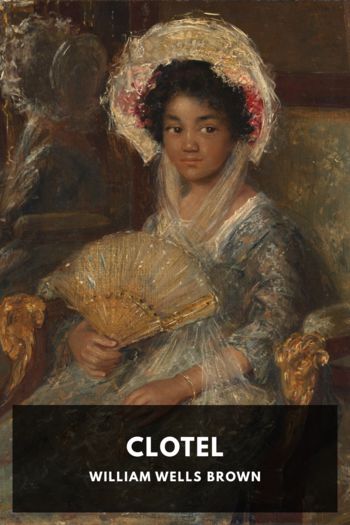Clotel - William Wells Brown (good books to read for beginners txt) 📗

- Author: William Wells Brown
Book online «Clotel - William Wells Brown (good books to read for beginners txt) 📗». Author William Wells Brown
What words can tell the inhumanity, the atrocity, and the immorality of that doctrine which, from exalted office, commends such a crime to the favour of enlightened and Christian people? What indignation from all the world is not due to the government and people who put forth all their strength and power to keep in existence such an institution? Nature abhors it; the age repels it; and Christianity needs all her meekness to forgive it.
Clotel was sold for fifteen hundred dollars, but her purchaser was Horatio Green. Thus closed a negro sale, at which two daughters of Thomas Jefferson, the writer of the Declaration of American Independence, and one of the presidents of the great republic, were disposed of to the highest bidder!
O God! my every heart-string cries,
Dost thou these scenes behold
In this our boasted Christian land,
And must the truth be told?
Blush, Christian, blush! for e’en the dark,
Untutored heathen see
Thy inconsistency; and, lo!
They scorn thy God, and thee!
My country, shall thy honoured name,
Be as a bye-word through the world?
Rouse! for, as if to blast thy fame,
This keen reproach is at thee hurled;
The banner that above the waves,
Is floating o’er three million slaves.
Dick Walker, the slave speculator who had purchased Currer and Althesa, put them in prison until his gang was made up, and then, with his forty slaves, started for the New Orleans market. As many of the slaves had been brought up in Richmond, and had relations residing there, the slave trader determined to leave the city early in the morning, so as not to witness any of those scenes so common where slaves are separated from their relatives and friends when about departing for the Southern market. This plan was successful; for not even Clotel, who had been every day at the prison to see her mother and sister, knew of their departure. A march of eight days through the interior of the state, and they arrived on the banks of the Ohio river, where they were all put on board a steamer and then speedily sailed for the place of their destination.
Walker had already advertised in the New Orleans papers that he would be there at a stated time with “a prime lot of able-bodied slaves ready for field service; together with a few extra ones, between the ages of fifteen and twenty-five.” But, like most who make a business of buying and selling slaves for gain, he often bought some who were far advanced in years, and would always try to sell them for five or ten years younger than they actually were. Few persons can arrive at anything like the age of a negro by mere observation, unless they are well acquainted with the race. Therefore the slave-trader very frequently carried out this deception with perfect impunity. After the steamer had left the wharf, and was fairly on the bosom of the Father of Waters, Walker called his servant Pompey to him, and instructed him as to “getting the negroes ready for market.” Amongst the forty negroes were several whose appearance indicated that they had seen some years, and had gone through some services. Their grey hair and whiskers at once pronounced them to be above the ages set down in the trader’s advertisement. Pompey had long been with the trader, and knew his business; and if he did not take delight in discharging his duty, he did it with a degree of alacrity, so that he might receive the approbation of his master. “Pomp,” as Walker usually called him, was of real negro blood, and would often say, when alluding to himself, “Dis nigger is no countefit; he is de genewine artekil.” Pompey was of low stature, round face, and, like most of his race, had a set of teeth which for whiteness and





Comments (0)